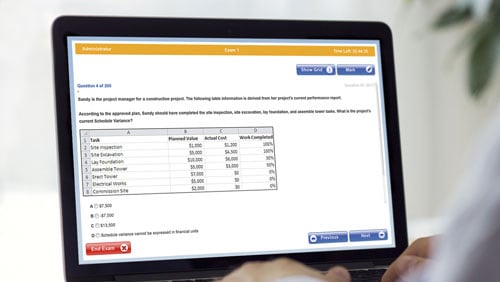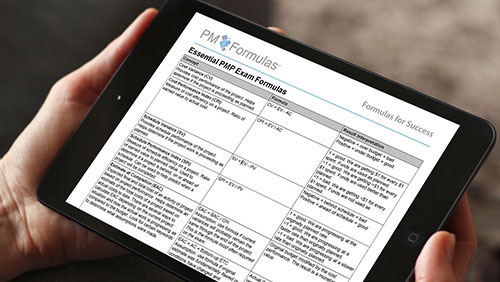Create a PMP® Study Plan to Prepare for Success
 Taking the PMP® Exam is one of the biggest steps you’ll take in your career as a Project Manager — and one of the most daunting. There seems to be an endless parade of information to cram into your brain but don’t let that discourage you! With careful planning and structure you can pass the exam with a minimum of stress and absorb more of the information you’ll need to be a success in your chosen career.
Taking the PMP® Exam is one of the biggest steps you’ll take in your career as a Project Manager — and one of the most daunting. There seems to be an endless parade of information to cram into your brain but don’t let that discourage you! With careful planning and structure you can pass the exam with a minimum of stress and absorb more of the information you’ll need to be a success in your chosen career.
Break Your PMP Study Plan Into Small Pieces
The very first thing you need is a study plan. Assess your daily obligations; many people devote months to their studies and ignore the other things they need to do every day. List your normal schedule and then assign a daily time for study, usually 90-120 minutes. By establishing a routine you have study time allotted, which helps minimize distractions. When distractions set in catch-up becomes tedious and interferes with studies.
Why assign a time limit for study? There are only so many hoops you can make your brain jump through before it tires and begins to stumble. Just like pushing yourself physically, after awhile pushing yourself mentally becomes useless and you start to lose the progress you’ve made. By limiting your study time you actually increase your retention time and the amount of knowledge you can absorb! This may be one of the most important things you can do for your future if your goal is to be the best Project Manager you can be. You’ll only need 61 percent to pass the exam but aim a lot higher if you want to enjoy being the very best at what you’ve chosen to do.
Set Weekly Goals and Track Your Progress in your PMP Study Plan
Setting weekly goals and keeping track of your progress will not only encourage you as you study, you’ll be able to make the most of your time and study more effectively. Instead of skipping around and perhaps missing an important area of study, you’ll cover everything thoroughly. Before you begin it would be a good idea to make a chart of your objectives, week-by-week. This will help you to focus on daily goals and not to cram too much into each session. You will retain much more by concentrating on one subject at a time. Since you need to learn so many things about so many subjects it may be best to divide the subjects into categories that make sense to you. If there is something of particular interest to you that you really enjoy you might place it in such a way that it “rewards” you after an especially difficult section of study.
Practice Repetition to Solidify your New Knowledge for the PMP Test
Repetition is another good technique for solidifying your new knowledge. Believe it or not, repeating a fact to yourself creates a neural pathway that your memory can travel again. Rather than “burning” it into your memory, you’re clearing a trail through the undergrowth with the important knowledge at the end of the path. By repeating something to yourself or writing it on paper you’re walking it home where it will stay as long as you visit it occasionally. It’s best to practice repetition every day for at least a month and ideally for two months. If possible, you should do your repetitive mental calisthenics when you first get up, as the brain is at its most receptive immediately upon awakening. Plus, relaxing in bed for ten minutes while you mentally repeat what you want to remember can be very pleasant and reinforce a positive outlook toward your PMP test!
Attend PMP Boot Camps
You have undoubtedly heard of PMP boot camps; 2-5 day cram courses for the exam that can cost thousands of dollars and claim a 95 percent pass rate. Most boot camps base the majority of their class time on the A Guide to the Project Management Body of Knowledge (PMBOK® Guide), which is available for much less than the cost of a boot camp. By reading through and highlighting the most important passages you’ll probably learn nearly as much for a fraction of the price of a boot camp. You would be better advised to make your plan, establish a routine, break your learning into small chunks, and reinforce your learning through repetition.
Give Yourself a Break from your PMP Studies
A very important last suggestion — everyone needs a break. Even if you’re enjoying your studies you should take at least one full day a week to get completely away from it and do other things. It doesn’t have to be a big production or cost a lot of money; a morning walk, reading, a movie, a play, or anything that truly relaxes and refreshes you is just as important as the work you do the rest of the week.
Watch this video for more study tips and techniques to successfully pass the PMP exam.


